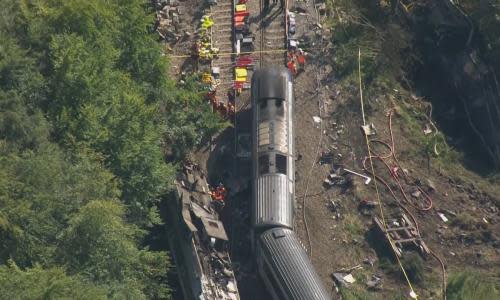Stonehaven tragedy highlights threat to rail from climate crisis

The derailment of a ScotRail train in rural Aberdeenshire with the loss of three lives adds Stonehaven to a grim roll call of names, instantly identifiable with tragedy to those associated with the UK railway: the likes of Potters Bar, Hatfield and Grayrigg. It will be no consolation at all to those grieving lost colleagues, spouses and parents to know just how far apart such tragic events have lately become.
The last time a passenger died in a train crash in the UK was the Grayrigg derailment in 2007, when a Virgin high-speed train went down an embankment in Cumbria, miraculously with just one casualty. Before Wednesday, the last time a driver had been killed in a crash was in 2004; and the last disaster with multiple fatalities, Potters Bar, was as far back as 2002.
The railway in Britain has been justly, if quietly, proud of a vastly improved safety culture, which tightened up on all aspects over the decades, from personal wellbeing to track maintenance to train warning systems. And yet, as one union leader remarked presciently earlier this year, it was never wise to presume too much, that disaster could not loom again.
Questions will have to be asked now again about the state of the infrastructure, even given the biblical summer rains that fell in the runup to the ScotRail train’s derailment. Rail staff had tweeted out footage of suddenly flooded tracks, mud and shrubs washed down to block the Scottish tracks.
While safety inspectors will now ascertain the exact causes, it appears that the driver, having reversed from his initial path from Aberdeen to Glasgow because of such an obstacle, was not able to avoid a second landslip.
In the midst of some of the hottest weather on record, accompanied by thunderstorms and flash flooding, it looks abundantly clear that the climate is changing – and certainly key figures in the rail industry have long warned that it needs to prepare for a new challenge. The rail regulator, the ORR, while clawing back some Network Rail budget, has in past years made extra provision to combat what it said would be an ever-growing problem.
Extremes of temperature had the potential to buckle rails last summer, forcing trains across Britain to go slow. The combination of drought and sudden, torrential downpours has the capacity to erode track beds and make embankments crumble.
One of the most high-profile repair works in recent years was to restore the line at Dawlish, where the damaged sea wall had cut off train services to the far south-west of England. The regulator had warned Network Rail again, just four weeks ago, that its plans to address climate change were not in step with the new frequency, and severity, of flooding on the railway.
The ORR’s health and safety report found that there were six times more flood incidents last year than in the previous one, more landslips, all adding up to a vulnerable network. ScotRail’s own boss warned last year that the railway “cannot cope” with the climate emergency right now. He has been proved tragically right.

